I'm trying to transfer ca. 10GB of json data (tweets in my case) to a collection in arangodb. I'm also trying to use joblib for it:
from ArangoConn import ArangoConn
import Userdata as U
import encodings
from joblib import Parallel,delayed
import json
from glob import glob
import time
def progress(total, prog, start, stri = ""):
if(prog == 0):
print("")
prog = 1;
perc = prog / total
diff = time.time() - start
rem = (diff / prog) * (total - prog)
bar = ""
for i in range(0,int(perc*20)):
bar = bar + "|"
for i in range(int(perc*20),20):
bar = bar + " "
print("\r"+"progress: " + "[" + bar + "] " + str(prog) + " of " +
str(total) + ": {0:.1f}% ".format(perc * 100) + "- " +
time.strftime("%H:%M:%S", time.gmtime(rem)) + " " + stri, end="")
def processfile(filepath):
file = open(filepath,encoding='utf-8')
s = file.read()
file.close()
data = json.loads(s)
Parallel(n_jobs=12, verbose=0, backend="threading"
(map(delayed(ArangoConn.createDocFromObject), data))
files = glob(U.path+'/*.json')
i = 1
j = len(files)
starttime = time.time()
for f in files:
progress(j,i,starttime,f)
i = i+1
processfile(f)
and
from pyArango.connection import Connection
import Userdata as U
import time
class ArangoConn:
def __init__(self,server,user,pw,db,collectionname):
self.server = server
self.user = user
self.pw = pw
self.db = db
self.collectionname = collectionname
self.connection = None
self.dbHandle = self.connect()
if not self.dbHandle.hasCollection(name=self.collectionname):
coll = self.dbHandle.createCollection(name=collectionname)
else:
coll = self.dbHandle.collections[collectionname]
self.collection = coll
def db_createDocFromObject(self, obj):
data = obj.__dict__()
doc = self.collection.createDocument()
for key,value in data.items():
doc[key] = value
doc._key= str(int(round(time.time() * 1000)))
doc.save()
def connect(self):
self.connection = Connection(arangoURL=self.server + ":8529",
username=self.user, password=self.pw)
if not self.connection.hasDatabase(self.db):
db = self.connection.createDatabase(name=self.db)
else:
db = self.connection.databases.get(self.db)
return db
def disconnect(self):
self.connection.disconnectSession()
def getAllData(self):
docs = []
for doc in self.collection.fetchAll():
docs.append(self.doc_to_result(doc))
return docs
def addData(self,obj):
self.db_createDocFromObject(obj)
def search(self,collection,search,prop):
docs = []
aql = """FOR q IN """+collection+""" FILTER q."""+prop+""" LIKE
"%"""+search+"""%" RETURN q"""
results = self.dbHandle.AQLQuery(aql, rawResults=False, batchSize=1)
for doc in results:
docs.append(self.doc_to_result(doc))
return docs
def doc_to_result(self,arangodoc):
modstore = arangodoc.getStore()
modstore["_key"] = arangodoc._key
return modstore
def db_createDocFromJson(self,json):
for d in json:
doc = self.collection.createDocument()
for key,value in d.items():
doc[key] = value
doc._key = str(int(round(time.time() * 1000)))
doc.save()
@staticmethod
def createDocFromObject(obj):
c = ArangoConn(U.url, U.user, U.pw, U.db, U.collection)
data = obj
doc = c.collection.createDocument()
for key, value in data.items():
doc[key] = value
doc._key = doc["id"]
doc.save()
c.connection.disconnectSession()
It kinda works like that. My problem is that the data that lands in the database is somehow mixed up.

as you can see in the screenshot "id" and "id_str" are not the same - as they should be.
what i investigated so far:
I thought that at some points the default keys in the databese may "collide" because of the threading so I set the key to the tweet id.
I tried to do it without multiple threads. the threading doesn't seem to be the problem
I looked at the data I send to the database... everything seems to be fine
But as soon as I communicate with the db the data mixes up.
My professor thought that maybe something in pyarango isn't threadsafe and it messes up the data but I don't think so as threading doesn't seem to be the problem.
I have no ideas left where this behavior could come from... Any ideas?